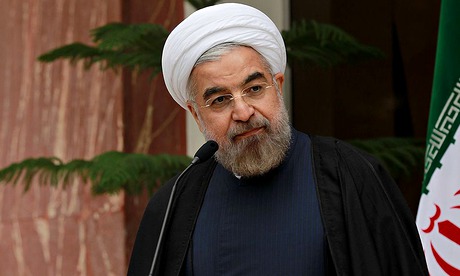
Next month, Hassan Rouhani will mark his first anniversary in Tehran's Pasteur Street, where the offices of the Iranian president are based.
But his celebration will be incomplete if there is no agreement in Vienna by the end of this week. Rouhani needs a deal to keep his moderate mandate safe, as hardliners circle like vultures, waiting for him to fail.
That pressure to produce results will sound familiar to John Kerry and the US diplomats who arrived on Sunday in the Austrian capital to galvanise talks for a comprehensive nuclear deal before the 20 July deadline.
But for Rouhani and his team, the task is perhaps even more urgent than for Barack Obama, who is desperate for a single foreign policy achievement to leave as his legacy.
In Tehran, the ultimate decision-maker is Ayatollah Ali Khamenei, the supreme leader, who despite being unelected and a top religious authority, can change the fate of the ongoing talks overnight against Rouhani's wishes.
For now, the cleric appears to be backing Rouhani's negotiating team, which is led by the country's foreign minister, Mohammad Javad Zarif.
The US-educated veteran diplomat has described himself as a follower of Khamenei, but is also a confident of Rouhani and remains popular with the general public.
In the light of Khamenei's support, opponents of the deal have kept quiet. Among them is Saeed Jalili, Iran's former leading nuclear negotiator, who failed to bring a solution even an inch closer. Jalili and his allies can barely conceal their resentment at Rouhani's "constructive engagement" with the west.
A year after assuming power, Rouhani has had some remarkable achievements, not least putting an end to eight years of political infighting under his predecessor, Mahmoud Ahmadinejad.
He also became the first Iranian leader to hold direct talks with a US leader, in a historic telephone call with Obama last year.
But international sanctions against Iran are still in place, almost intact in spite of an interim deal, and although Rouhani has curbed inflation, reduced the mismanagement of the Ahmadinejad era and inspired some hope among the public, he has plenty to do.
Rouhani's big challenge, besides securing a nuclear deal and ending sanctions, is an Iranian version of glasnost: increasing social freedoms and releasing imprisoned dissidents, activists and journalists. Failure to reach a nuclear deal would make reform at home difficult, if not impossible.
Meanwhile, the hardliners have not stood idly by. The judiciary and the elite revolutionary guards have tightened their grip on social and cultural norms, arresting more journalists and handing down heavy sentences to activists and dissidents.
Religious and ethnic minorities still face discrimination and Rouhani's promise to overturn the ban on Facebook and Twitter is yet to materialise. Moreover, opposition leaders Mir Hossein Mousavi and Mehdi Karroubi remain under house arrest.
Khamenei, in office for 25 years, holds the key – on the Iranian side – to a way out of the decades-long impasse over Tehran's nuclear programme.
He declared last week that he had complete faith in Rouhani's negotiation team, but in the same speech tied their hands by laying out Iran's maximalist position: a tenfold boost to its uranium enrichment programme, so it can produce all its own nuclear reactor fuel.
The declaration made it harder for Iranian negotiators to make compromises and for Rouhani to claim victory in Vienna.
It was unclear whether the supreme leader was attempting to torpedo the negotiations, or merely distancing himself from them.

